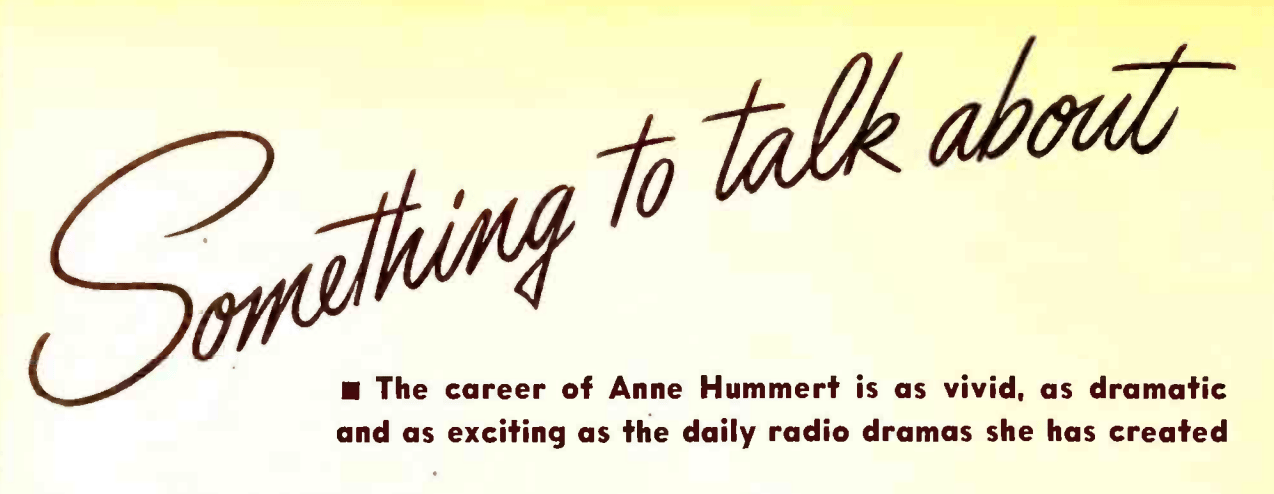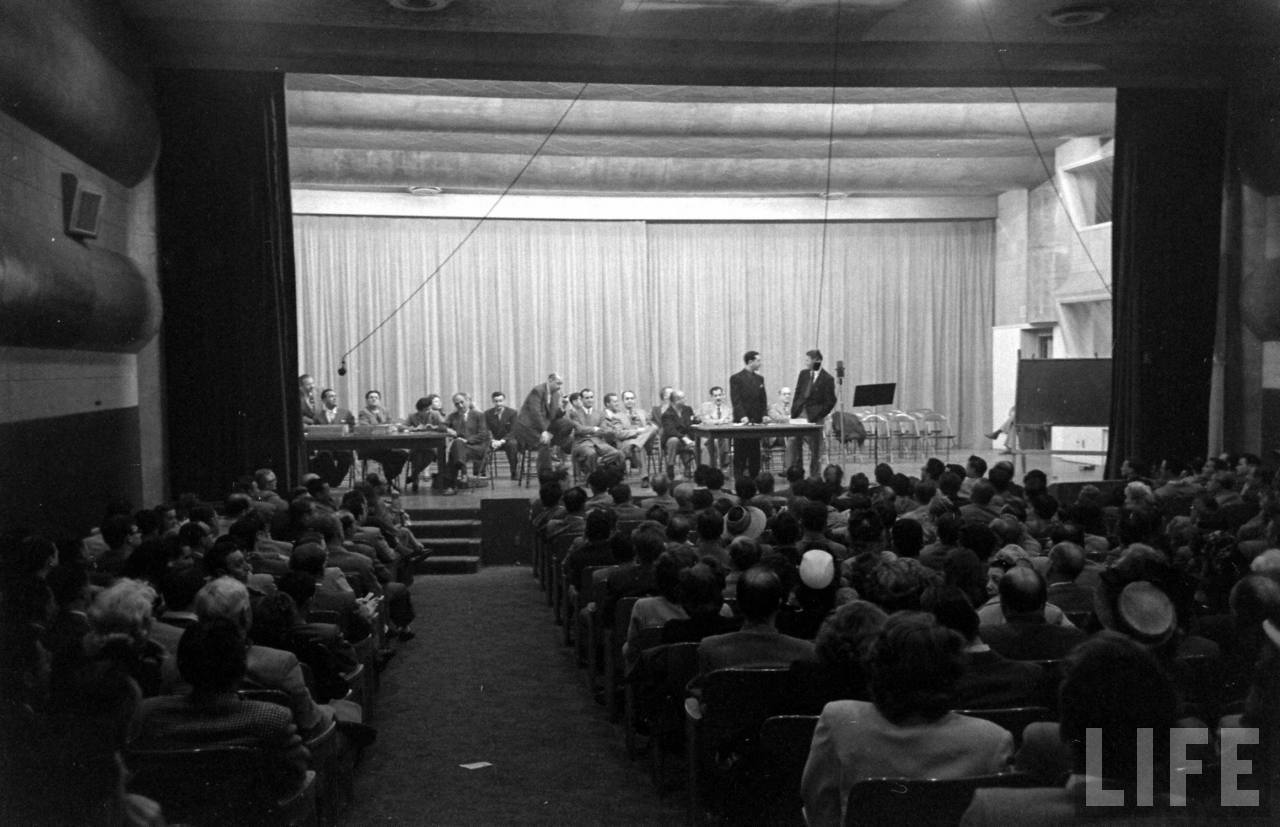When we last left off (after a brief digression), our heroes — the put-upon writers of mid-20th-century American radio — were struggling to earn basic respect and income in a business mostly taken over by ad agencies. Feared and loathed above all were the power couple Frank and Anne Hummert, who ran a “soap opera factory,” churning out 15-minute scripted daily dramas about social anxieties and hopeless love for brands such as Procter & Gamble.
Desperate to get a foothold in one of the few profitable businesses during the Great Depression, writers would sign up to be “dialoguers” on Hummert soaps, filling in conversations and scenes that could move the plot a micro-step forward each day. Writers got no credit for this work, and many didn’t want their names on it anyway, since there wasn’t much to boast about. The work was steady, given the American public’s bottomless demand for never-ending dramas. But the pay per Hummert script was much lower than much of the radio industry.
Many radio writers came from the stage, and some from the worlds of literature or Hollywood. All found broadcasting’s treatment of writers pretty appalling. Here I have to recommend the fine scholarship of Catherine Fisk in her book Writing for Hire.
The terms on which radio writers were hired could be quite exploitative. Freelancers were expected to write “audition” scripts for free; an audition script was essentially a pilot episode of a show, and the agency or network would acquire all the rights in the script and its ideas and characters with no provision for profit sharing to the writer.
Why didn’t writers at least get copyright protection for their ideas or words? That was because of a provision of the Copyright Act of 1909 (a law that created many other bad precedents, as CW guest-poster Dan Koch points out). The law declared who got to claim “authorship” status when a piece of writing was done “for hire”: the employer was the author of such a work, and thus holder of the copyright.
With very few exceptions, then, radio hacks were not “authors” of their own work. Networks, production companies (called “packagers”), or ad agencies were the authors — and in the latter case, the agencies actually made their clients the authors.
Ad agencies registered copyrights in their clients’ names for everything from scripts to musical compositions used as jingles to leaflets, package inserts, and posters…The ad agencies’ view of authorship was thus more like the law of trademark than the law of copyright: under trademark law, no matter who created the trademarked brand name, logo, or slogan, the trademark rights belong to the producer of goods or services associated with the trademark, not to the person who created the mark.
Enter the guilds
OK, here comes the part that frankly makes my head hurt. So: the law says when it comes to writing for hire, the copyright owners were the employers. Did it then follow that the writers were “employees”? In our current blighted freelancing landscape, this might sound like a far-fetched question. But it was not a far-fetched thing to ask in the mid-1930s, following the passage of the National Labor Relations Act.
Over in Hollywood, the Screen Writers Guild successfully argued that its members were indeed “employees” of the studios. Thus they should have the right to bargain collectively for things like consistent and better pay, and on-screen credits. The SWG soon gained government recognition as the sole collective bargaining agent for Hollywood writers. They finally won their first Minimum Basic Agreement with the film industry in 1942. It turned out that being deprived of “authorship” under the law did have a consolation prize in the form of collective bargaining rights.
Broadcasters saw all this coming for them, too, after the formation of the Radio Writers Guild (RWG) in 1937. But the economics of broadcasting back then worked very differently from Hollywood. At least screenwriters worked on a product that, in theory, made money through ticket sales. Radio dramas were broadcast live over the airwaves for free. The only entities propping up US broadcasting’s bizarre business model were advertisers. And they, along with the agencies that represented them, did not love the thought of collectively bargaining with a bunch of script scribblers.
Freelance writers were treated as ad agency employees for tax purposes, but they were not staff of the production company or the agency. Their liminal status as freelancers — they were not employees in the ordinary sense of the word — created unique legal challenges.
Five years after the SWG got its first Hollywood contract signed, the RWG was still struggling. They’d established agreements with radio networks, mainly for writers on shows produced in-house, such as the Columbia Workshop at CBS. But the Guild was going around in circles with ad agencies, who insisted on total dominion over the writers — def not employees or authors by the way! — that those agencies needed, so actors had tearjerking scripts to deliver, day in and day out.
Medieval times
For you, dear readers, I made an appointment and went down to the New York Public Library’s archives, where they house 90(!) boxes of internal RWG documents. I was particularly interested in the years 1947-8, because that’s when things finally came to a head for writers in radio. Columbia University professor, future media historian, and my personal king Erik Barnouw was RWG president at the time. Sure enough, I found a typescript of his June 1948 report to the membership. He calls the treatment of radio writers “medieval” and “primitive.” I know more than a few audio producers today would pump their fists were they hearing Barnouw deliver his words.

— Erik Barnouw’s June 1948 report to RWG membership (NYPL Archives)
On October 21, 1948, the membership of the RWG — which had swelled to 1200, most of them in New York, but many in LA and Chicago — voted to go on strike. Picketing of network studios and even ad-agency “packagers” would begin in five days.
It’s interesting, given his stirring speech, to later read Barnouw’s internal reaction to this moment. After the strike vote, followed by his re-election as RWG president, he felt “horror,” he confessed in his 1996 memoir Media Marathon. Barnouw really did not want to be known as a national leader of a strike. He was a university professor, and his success depended on access to guest speakers from the radio industry. Furthermore, there was a lot of Red Scaring already underway in broadcasting (more on that in this post).
Barnouw was probably right to feel paranoid, not just on his own behalf, but on behalf of the membership. So he welcomed the volunteer services of a federal labor conciliator named JR Mandelbaum, a guy who swooped in after major strike votes. To the disgruntlement of radio-activists, pickets were put on hold while Mandelbaum conducted “shuttle diplomacy” between the RWG and the ad agencies.
Then, Barnouw writes, he got a surprising message. The Hummerts wanted to have lunch with him.
Anne Hummert had actually once spoken to Barnouw’s students almost a decade earlier, he writes: “She spoke without notes, never hesitating. After talking for about forty minutes, she answered questions in the same brisk manner, seemingly ready for every question.” Barnouw later figured out that Anne Hummert had memorized her whole lecture verbatim.
Now he sat across from her and her husband Frank at a special table the Hummerts kept at a Park Avenue restaurant, secluded in a corner by potted palms. They made some chit-chat, and then Frank Hummert got down to business.
“So here’s what we’d like to do,” he announced. “We would like to join the Radio Writers Guild. We want to be able to say to our sponsors, ‘We are union members. There’s been this strike vote. We have to go along. We have no choice.’”
Barnouw’s jaw was on the floor. But he recovered, and assured the Hummerts they’d be welcome members of the RWG. Still, what about their production company, Air Features (derogatory)?
Frank Hummert replied with some shell game talk that would do a modern-day money launderer proud. “You probably think I own Air Features. That’s what everybody thinks. I don’t own it. I’m just an employee. I set it up that way on purpose,” Barnouw recalls him saying.
But, Hummert said, he’d be happy to get the “president” of Air Features to sign the guild’s Minimum Basic Agreement. So after lunch, they walked over to the office and got it signed. The Hummerts were now card-carrying members of the Radio Writers Guild, presumably ready to picket their own selves if called to do so.
But there wouldn’t be any need for that. A couple of days after this weird encounter, according to Barnouw, the federal conciliator Mandelbaum announced that the ad agencies had finally decided to come to the table. The picket-line was averted (this time). By 1949, the RWG had hammered out a Minimum Basic Agreement with the ad agencies, one that covered matters such as credit and freelance contracts.
Radio scholar Michele Hilmes thinks the two main “employees” of Air Features, Frank and Anne Hummert, had shrewd ulterior motives in breaking the impasse with the RWG. “The Hummerts had discovered a way to have their cake and eat it too. By joining as writers, they affirmed their claim to original authorship of their many serials, despite the anonymous, work-for-hire condition of the many writers who contributed to them,” she writes.
Still, I did find in the RWG files at the New York Public Library a report from the Guild’s executive secretary dated Feb. 28, 1950. One of the items concerns what apparently had been ongoing negotiations with Air Features.

So at least a few beleaguered hacks finally got to cash some bigger Hummert checks. Collective action was good while it lasted. But it would not last long. Because the RWG was not much longer for this world.
The story of what happened will have to wait for yet another post. But here’s a little cliffhanger. What do you think was the final bank balance of the Radio Writers Guild?



